Dancin’ Down the Bayou // To the Dance Hall
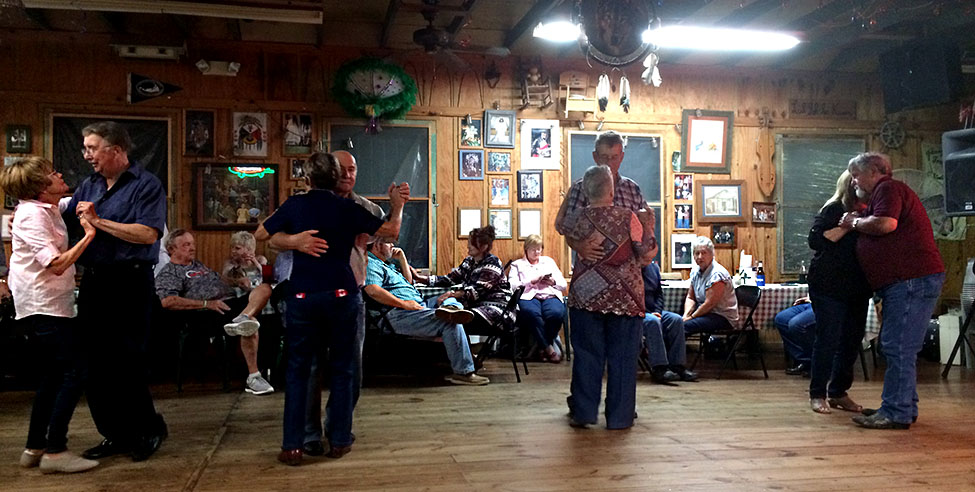
by Eric Diggs, video editor Check out where locals go to listen and dance to music
Drinkin’ Things // Bayou Spirits
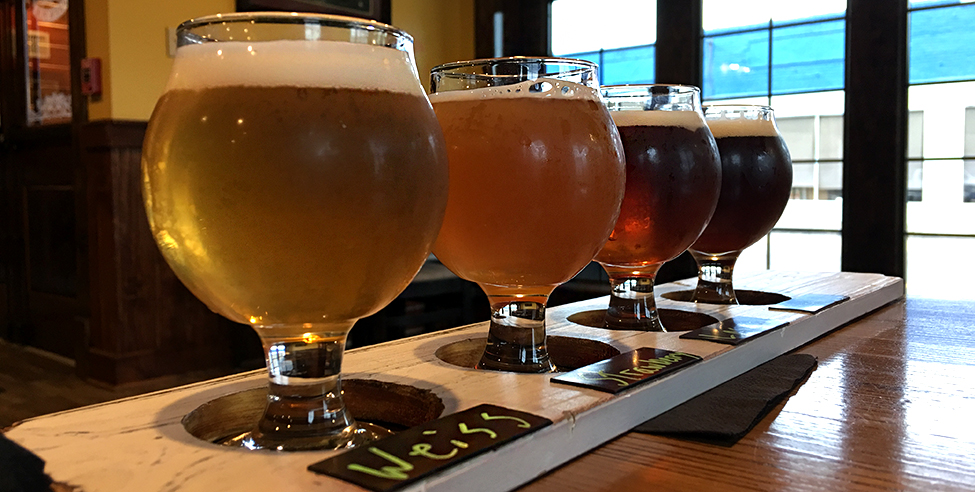
by Jenna Quick, photo editor https://youtu.be/rJG8cJJjM5ICheck out how to make and where to get a few local drink specialties
Locals’ Favorite Foods // Bayou Cookin’
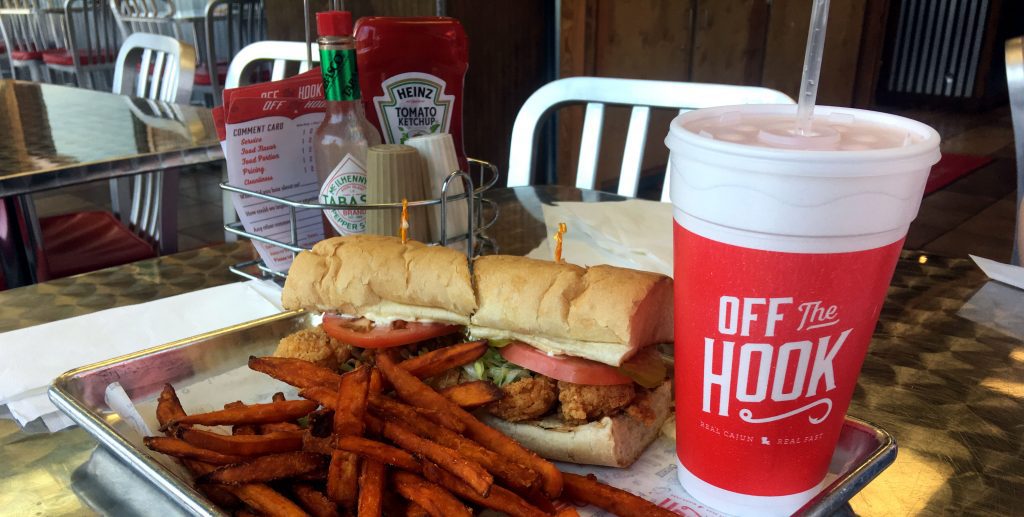
by Eric Diggs, video editor Check a few local favorite spots for good eats: Check a few local favorite spots for good eats:
Homemade Specialties // Bayou Craftin’
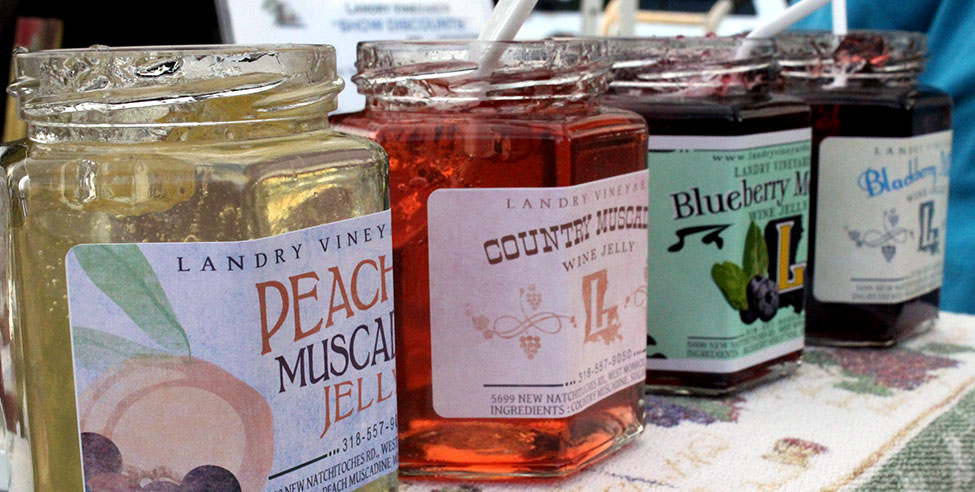
South Louisiana prides itself on its deep-rooted history and culture and locals use that culture as an inspiration for their own creativity and crafts. “Everyone has different stories. In South Louisiana, people bring their stories to life through various types of art,” says Alex Gwinn, a craft-show regular and Thibodaux native. “Just like a pot of gumbo, you can add varying ingredients to make something really special and unique.” The Bayou Region is home to many craft shows including Southdown Marketplace, Thibodeauxville and Poche Plantation Arts and Crafts Charity. And even when the main focus isn’t on crafts, local arts are almost always present at the many festivals across the state. From jewelry, bath and body products, cards, artwork, personalized items, candles, bows, and more, local artisans bring their culture and heritage to life. Hailey Cortez, Thibodaux native ad owner of Grey Handcrafted, makes essential oil jewelry and says crafting is all about connecting and community. “[South Louisianans] already love to talk, so talking about something you personally developed and hearing the background of businesses is really easy, fun and enjoyable,” Cortez says. Gwinn, who grew up spending weekends going to craft shows and markets and now drags her friends along, says supporting local businesses and people is important. “The really cool part is learning the background of the item or business,” Gwinn says. “It’s fun and it makes you appreciate the product and the person who made it.” by Jenna Quick, photo editor
Takin’ Aim // Huntin’ Down the Bayou
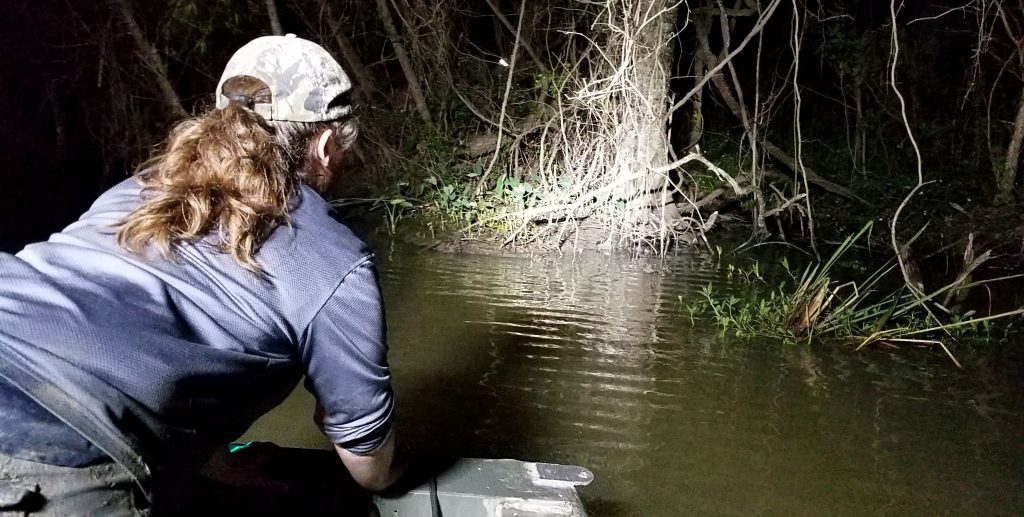
by LaToya Roberts, managing editor Hunting in South Louisiana is a way of life that dates back to the first settlers of the region. It’s a a life of enjoying and living off of the abundant natural resources like ducks, deer, squirrels and rabbits. “It’s here and we have it here to enjoy,” says Capt. Chuck Comeaux of the Wildlife and Fisheries Department in Thibodaux. “We’re blessed here, in ‘Sportsman’s Paradise.’” Comeaux says hunting and fishing in Louisiana goes back to the first settlers who hunted to eat, sell or trade. “Most of our ancestors here, down South, started as hunters,” says Comeaux. “The society became all about hunting and fishing.” Since then, the hunting tradition has changed a little because of government regulations and less dependence on hunting to survive, Comeaux says. And even though hunting is not the only way to make a living today, some of the traditional practices, passed on from generation to generation, are still common today. “Hunting is in my blood,” Comeaux says. “My grandpa, my father, me and now two of my sons, we all hunt because that’s what we were raised to do.” Another local hunter, Houma resident Aaron White, who grew up duck hunting with his dad, says he’s looking forward to passing on the tradition to his own kids one day. “My dad starting taking me duck hunting when I was really young,” White says. “I’ll never forget the excitement of the upcoming duck season. I still feel the same today.” Vacherie native and avid hunter Thomas Joseph, Jr. says he has been hunting as long as he can remember — leaving with his dad and brothers before the sun came up and not coming home until after dark. “I remember helping my daddy prepare for his hunting trips when I was a little boy,” says Joseph, who enjoys small-game hunting like rabbits and racoons best. “I was so excited, that I used to be ready and out of the door before he was. I loved every moment of it.” Joseph says even though his own children aren’t interested in hunting, he shares his knowledge and love for hunting with many of his friends, nephews and other relatives. “It was a tradition in my family growing up,” Joseph says. “Even though my daughter doesn’t like to hunt, I’m glad I can call on some of the people that I’m close to to come with me when I have a taste for rabbit stew.” by Jenna Quick, photo editor by Eric Diggs, video editor
Bayou Campin’ // Elevated Livin’
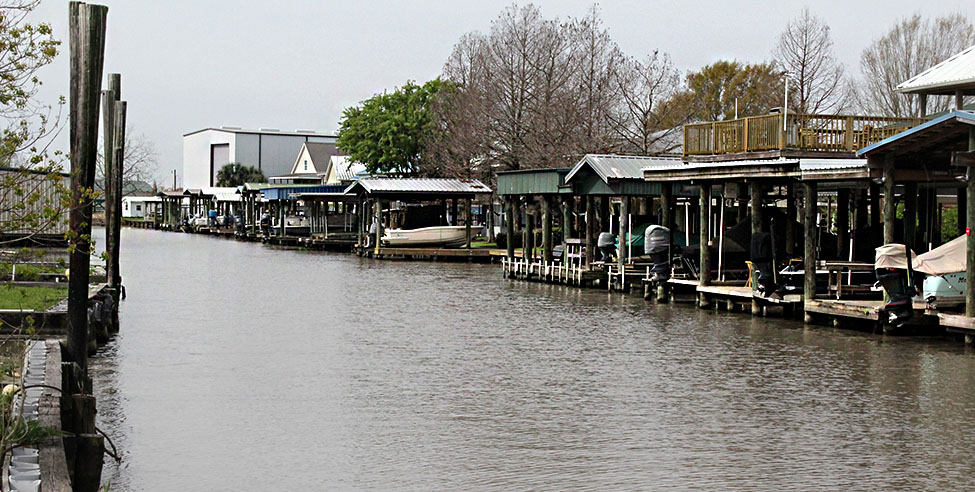
by Mallory Matherne, co-features editor Camping in South Louisiana is the Cajun way of taking time off and getting together with family and friends to play in the water — whether it’s boating, swimming or hunting and fishing. Louisiana isn’t home to many beaches, so locals make do with what they have building get-away homes on bayous, lakes and the Gulf. “Nothing beats going to the camp for a weekend,” says Blaine Landry, who has a camp in Grand Isle. “I meet so many people out there just by anchoring my boat next to theirs. Someone offers you a beer and the next thing you know someone’s frying fish and grillin’ for everyone. Then next time you go to the camp you’ll see them again on the water or at the gas station or wherever and they act like y’all are lifelong friends. You can’t find that anywhere else.” When locals refer to “camps,” it means anything from a trailer on stilts to a mansion somewhere on water that isn’t a primary residence. Most all camps are raised high to avoid flooding using the space underneath for parking, storage and party space. Camps can have a single owner or be shared by family and friends with different people claiming different weekends and parts of the summer or even be rented out. Camps can also be grouped by function — a hunting camp just for the guys or a camp to bring the whole family. From Grand Isle on the Gulf of Mexico to Bayou Dularge and Lake Verret, these getaways are just a way for South Louisianans to enjoy the water. The camps “down the bayou” — a phrase locals use to describe the areas along the bayou toward the Gulf of Mexico — in Chauvin, Dulac, and Dularge are noted for their vibrant colors, mismatched knicknacks, and wrap-around decks. Some camps are smaller, one-story houses. Others are big enough to house several families and feature pools and hot tubs. Some of the more modern camps have elevators, electronic boat lifts, and a floating cabana. The older camps along the bayou ― the ones that survived the hurricanes ― were originally homes to local families. Although there are quite a few surviving camps, in the last few decades there’s been an influx of larger modern camps. These new camps were built solely to be rented as summer vacation spots. Boudreaux’s Marina owner Andre Boudreaux says most camps today are boarded up in the off-season and rented out from March to October. Boudreaux, who works in Chauvin at the marina and as a boat captain, says his customers become regulars pretty quickly. Most people will rent a camp for an entire summer. Boudreaux says almost no one lives in their own camps these days. Rayford Reeves, who owns a luxury houseboat that docks in Dulac, says the houseboat is a great investment — a party and a place to stay all in one. The houseboat has several bedrooms, a kitchen, an upper deck with a grill, and a boat lift for his motor boat. Reeves says he uses his houseboat to cook for and entertain business partners, party with his friends, and relax after a demanding workweek. “I can take my friends out for a day of drinking and partying on the water and no one has to worry about getting home safely,” he says. “They can all crash on the boat! It’s a mini getaway.” by Jenna Quick, photo editor
Crawfish Season // The Best Eatin’
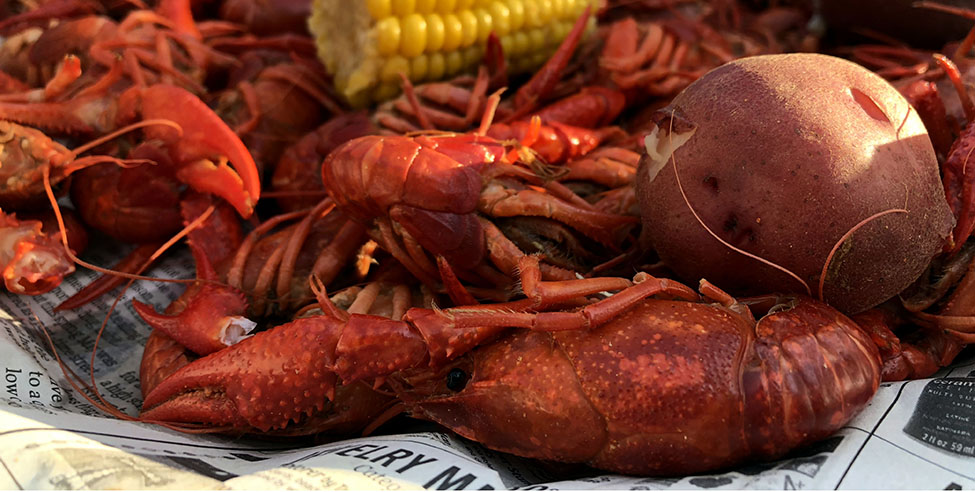
by Mallory Matherne, co-features editor In the Bayou Region, most traditions come from different cultures melting together. According to “The History of Crawfish in Louisiana,” crawfish boils originated from the Cajuns and from the local Native American tribes, who used to bait reeds with deer meat and catch the crawfish out of the creeks and ponds. Locals have taken traditions from both of these cultures and made them their own over time. Crawfish are not just a meal in South Louisiana, they’re a party. In fact, there’s an entire season the Bayou Region dedicates to crawfish boils. From February to July, weekends mean gathering your friends and family around folding tables on the back patio, drinkin’ your favorite beer, and blasting the radio while mixing crawfish dip. Each crawfish boil is different depending on who’s doing the boiling. Though the basics stay the same–a huge pot of boiling water, crawfish, and seasoning–the extra bits thrown into the pot vary depending on personal preference of the chef. Onions, potatoes, carrots, cauliflower, corn, mushrooms, garlic, and sausage are the usual additions to crawfish boils. Some people throw in bits like broccoli, green beans, celery, artichoke, lemons, pineapple, asparagus, olives, eggs, pickles, and even hot dogs and chicken wings! Mae Heck, a Thibodaux native, has been boiling crawfish for over 50 years. Heck has been boiling crawfish for her family every Friday during seafood season because “it’s the best reason to bring my family together.” Heck says another reason she likes boiling crawfish so often is because she feels like she’s mastered the craft. She said that the key to a perfect boil is how long you boil for. “I bring my crawfish to a boil for four minutes then I let them soak for eight,” Heck says. “I bring them back to a boil for another three or four minutes. That’s the perfect crawfish.” Crawfish are such a massive part of Southern culture that “Lent” has become synonymous with “crawfish season.” Catholics don’t eat meat on Fridays in Lent, so every Friday finds people setting the table with their crawfish trays. Although there are plenty of seafood restaurants in southern Louisiana, it’s businesses that sell crawfish by the sack that really see business boom during crawfish season. Angie Francis, owner of Bayou Cane Seafood in Houma, says, “Crawfish season is always the best time of year for us. We sell seafood all year long, but the anticipation of crawfish season drives people crazy. They have to have it.” Francis has owned Bayou Cane for 10 years and says she still doesn’t know how to prepare for crawfish season. She says that every season is different and the size and quality of the crawfish depends on the weather each year. Regardless, business is always booming during crawfish season for her because, as Francis says, “people love their crawfish.” by Jenna Quick, photo editor
Bon Moment // Let the Good Times Roll on the Bayou
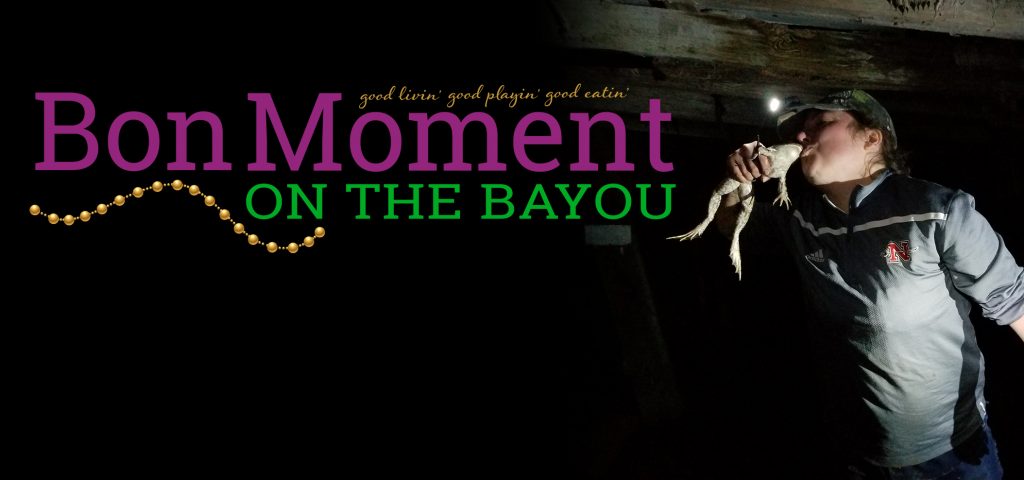
by Hannah Carlos & Mallory Matherne, co-features editors There’s a reason people from South Louisiana love the saying “Laissez les bons temps rouler.” Down in the Bayou Region, the locals always let the good times roll. And if asked what makes up the heart of the Bayou Region, locals all give a different story. Misty Rhodes of Louisiana’s Cajun Bayou in Raceland said the locals’ heritage is unapologetic. “That’s just the way we are,” she says. The good times really start rollin’ in the season of spring. Mardi Gras parades, delicious seafood, hunting wildlife and cooling down with flavorful snowballs are some things true locals do. In the South, locals live their lives based on the season. In the Lenten season, the work week is concluded by going home Friday afternoons and getting the backyard ready for a weekly crawfish boil. Weekend mornings usually start before the sun comes up because that’s when the fish are biting. If locals aren’t hunting and fishing on a Saturday morning, they’re at the snowball stand getting a treat before they head to the camp for a day of recreation and relaxation. A lot of the traditions in the Bayou Region are based off of good eatin’, good livin’ and good playin’. Most of the things locals do to pass the time involve food, drinks and music. Whether it’s a weekend lunch date with friends or even a funeral, everything down here becomes a celebration. Every meal has a beer with it, every award show is a reason to have a food-centered get-together and every Friday in the spring means foldable tables covered in newspapers with piles of crawfish. Bayou entertainment means more than Mardi Gras season and crawfish boils. It represents a simpler way of living that connects family and friends at every gathering. Jeanne Lirette, 70, said she recalls family gatherings occurring daily. She said the gatherings always involved seafood boils, dancing, drinking and quality time together. Although she was raised in the Bayou Region, Lirette was born in the Philippines and moved to South Louisiana at nine months old. Her parents met during World War II, tied the knot and moved to Louisiana after she was born. Lirette’s father owned a local seafood restaurant on the east side of Houma where she and her six siblings immersed themselves in the Bayou culture. “Family time became a way of life for me,” Jeanne says. “That’s where your value is. Because Louisiana living is so simple, you were able to focus on the real value and treasure in life. Louisiana made it easier. The bayou region and entertainment influenced these beliefs instilled in my life, and it still affects the way that my family lives their lives today.” Although Lirette has lived in the Bayou Region for most of her life, she said she could not imagine living anywhere else.Megan LeCompte was born and raised in Houma. She has lived other places, but she said there was something so special about Houma that she could not find anywhere else. “When my husband and I became pregnant with our first child, I knew I wanted my kids to grow up immersed in the same culture as I did,” said LeCompte. “I grew up fishing behind the house on weekend mornings, and now we have a bayou in the backyard so my boys can do the same.” LeCompte said, “I love having weekly crawfish boils and not having them be in celebration of anything, but having them just because we feel like it.” The community and atmosphere of the Bayou Region allows locals and guests to fully immerse themselves in the food, life and culture that the area has to offer while making everyone feel like they belong. So “look at this” and come visit the bayou for a taste of the Southern culture that will always leave “Bon Moments” to remember for a lifetime! MANAGING EDITOR LATOYA ROBERTS CONTRIBUTED TO THIS REPORT
